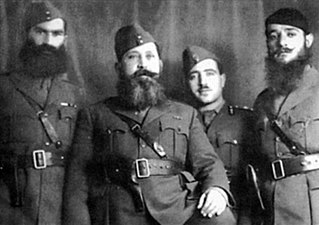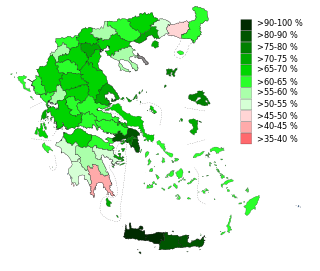| ||||||||||||||||||||||
All 398 seats in the Hellenic Parliament 199 seats needed for a majority | ||||||||||||||||||||||
|---|---|---|---|---|---|---|---|---|---|---|---|---|---|---|---|---|---|---|---|---|---|---|
| ||||||||||||||||||||||
| ||||||||||||||||||||||
Parliamentary elections were held in Greece on 16 December 1923. [1] The result was a victory for the Liberal Party, which won 250 of the 398 seats. [2]
| ||||||||||||||||||||||
All 398 seats in the Hellenic Parliament 199 seats needed for a majority | ||||||||||||||||||||||
|---|---|---|---|---|---|---|---|---|---|---|---|---|---|---|---|---|---|---|---|---|---|---|
| ||||||||||||||||||||||
| ||||||||||||||||||||||
Parliamentary elections were held in Greece on 16 December 1923. [1] The result was a victory for the Liberal Party, which won 250 of the 398 seats. [2]
After the defeat of the Liberals in 1920, Eleftherios Venizelos left the country, King Constantine I returned and Greece was soundly defeated by the newly reformed Turkey in the war in Anatolia. After the exile of King Constantine, his eldest son George was proclaimed King George II. After the national defeat and the definitive Treaty of Lausanne however, Greece was sorely divided.
| Party | Votes | % | Seats | |
|---|---|---|---|---|
| Liberal Party | 250 | |||
| Democratic Union–Democratic Liberals | 120 | |||
| Anti-Venizelists | 7 | |||
| Independent Democrats | 7 | |||
| Agrarian Party | 3 | |||
| Thessaloniki Jews | 3 | |||
| Western Thrace Muslims | 3 | |||
| Socialist Party | 1 | |||
| Independents | 1 | |||
| Total | 395 | |||
| Total votes | 694,448 | – | ||
| Source: Nohlen & Stöver | ||||
Parliamentary elections were held in Greece on 20 November 1977. After Prime Minister Constantine Karamanlis called for early elections, his New Democracy party lost a large number of seats, yet still retain an absolute majority in the Parliament. The big surprise was the success of PASOK, whose socialistic rhetoric remained radical. Because of PASOK's success, the Centrists led again by Georgios Mavros) lost half of their power. As a result, Andreas Papandreou, PASOK's leader, became a prominent figure in Greek politics. The Communists and the Nationalists managed to amplify their support.
Parliamentary elections were held in Greece on Sunday, 18 October 1981. PASOK, led by Andreas Papandreou, faced New Democracy, led by Georgios Rallis. Papandreou achieved a landslide and PASOK formed the first socialist government in the history of Greece.
Parliamentary elections were held in Greece on 13 June [O.S. 31 May] 1915. The result was a landslide victory for Eleftherios Venizelos and his Liberal Party, which won 187 of the 316 seats in Parliament. Venizelos claimed that his victory was proof that the Greek people approved of his policy, favoring the Allies of World War I.

Parliamentary elections were held in Greece on Sunday, 14 November 1920, or 1 November 1920 old style. They were possibly the most crucial elections in the modern history of Greece, influencing not only the few years afterwards, including the Greek defeat by Kemal Atatürk's reformed Turkish Land Forces in 1922, but setting the stage for Greece's political landscape for most of the rest of the 20th century. It had been nearly five years since the last elections, a period during which all democratic procedures were suspended due to the National Schism, when Prime Minister Eleftherios Venizelos announced that elections would take place on 25 October. However, after the unexpected death of King Alexander, who had assumed the throne after the exile of his father, King Constantine I, the elections were postponed until 14 November.
A referendum on restoring the monarchy was held in Greece on 3 November 1935. The proposal was approved by nearly 97.9% of voters, although the conduct during the referendum is not considered to have been free or fair. George II returned from exile and was restored to the throne on 25 November 1935.

A referendum on maintaining the monarchy was held in Greece on 1 September 1946. The proposal was approved by 68.4% of voters with a turnout of 88.6%.
A referendum on the return of King Constantine I was held in Greece on Sunday, 5 December 1920. It followed the death of his son, King Alexander. The proposal was approved by nearly 99% of voters. The anti-Venizelist parties had recently won the elections of 1920.
Parliamentary elections were held in Greece on 19 December [O.S. 6 December] 1915. They were boycotted by Eleftherios Venizelos and his party, the Liberal Party, as unconstitutional, a result of a confrontation with King Constantine I over the country's participation in World War I. Venizelos considered Greece as a close and loyal ally of the United Kingdom and France, while Constantine I, who was affiliated with the House of Hohenzollern, favored neutrality.

Parliamentary elections were held in Greece on 31 March 1946. The result was a victory for the United Alignment of Nationalists, an alliance that included the People's Party, the National Liberal Party, and the Reform Party, which won 206 of the 354 seats in Parliament. As a result, Konstantinos Tsaldaris became Prime Minister leading a right-wing coalition. Nonetheless, he soon decided to resign in favor of Themistoklis Sophoulis, who led a government of national unity during the entire second phase of the civil war (1946–1949). One of the priorities of the new government was the proclamation of a plebiscite for the restoration of the Greek monarchy.
A referendum on remaining a republic was held in Greece on 13 April 1924. It followed the catastrophic outcome of the Asia Minor Campaign. As a result of the military defeat, King Constantine I was forced to abdicate in favor of his son, King George II. King George himself later went into exile in the Kingdom of Romania, the home of his wife Elisabeth of Romania, while the government debated the fate of the monarchy. Ultimately, a referendum was called. This followed the restoration of Constantine I in 1920 and reflected the see-saw nature of the Greek electorate and the then-present dominance of the Liberal and Republican Venizelists in Greek politics and abolished the crown.
Early parliamentary elections were held in Greece on 8 April 1990. The conservative New Democracy party of Constantine Mitsotakis, was elected, defeating PASOK of Andreas Papandreou. In order to be able to command a majority of 151 in the 300-seat Parliament, New Democracy had to secure the support of Theodoros Katsikis, Democratic Renewal's sole MP. Shortly after Mitsotakis was given a confidence vote, the Supreme Special Court, after a mistake in seat calculation was detected, gave a 152nd seat to the coalition of New Democracy and Democratic Renewal.

Parliamentary elections were held in Greece on 10 October 1993. PASOK of Andreas Papandreou, was elected with 170 of the 300 seats, defeating the liberal-conservative New Democracy party of Constantine Mitsotakis.
Parliamentary elections were held in Greece on 2 June 1985. The ruling PASOK of Andreas Papandreou, was re-elected, defeating the liberal conservative New Democracy party of Constantine Mitsotakis.

A referendum on retaining the republic was held in Greece on 8 December 1974. After the collapse of the military junta that ruled the country since 1967, the issue of the form of government remained unsolved. The junta had already staged a referendum held on 29 July 1973, which resulted in the continuation of the republic. However, after the fall of the military regime, the new government, under Prime Minister Constantine Karamanlis, decided to hold another one, as junta constituent acts were considered void. Constantine II, the former king, was banned by the new government from returning to Greece to campaign in the referendum, but the Karamanlis government allowed him to make a televised address to the nation. 69% of voters favoured retaining the republic with a turnout of 76%.

A constitutional referendum was held in Greece on 29 July 1973. The amendments would confirm the abolition of the monarchy by the military junta and establish a republic. The proposal was approved by 78.6% of voters with a turnout of 75%.
A constitutional referendum was held in Greece on 15 November 1968. Voters were asked whether they wished to ratify a new constitution prepared by the dictatorial regime. It was approved by 92.1% of voters, with a voter turnout of 77.7%.
Parliamentary elections were held in Greece on 16 December 1843. The elected body was also tasked with drawing up a constitution, following the 3 September 1843 Revolution. The Three-Party Coalition won almost half the seats in the 243-seat Chamber.
Parliamentary elections were held in Greece between June and August 1844. Supporters of Andreas Metaxas emerged as the largest block in Parliament. However, Ioannis Kolettis became Prime Minister on 18 August.
The Farmers' Party was a political party in Greece in the 1920s and 1930s.